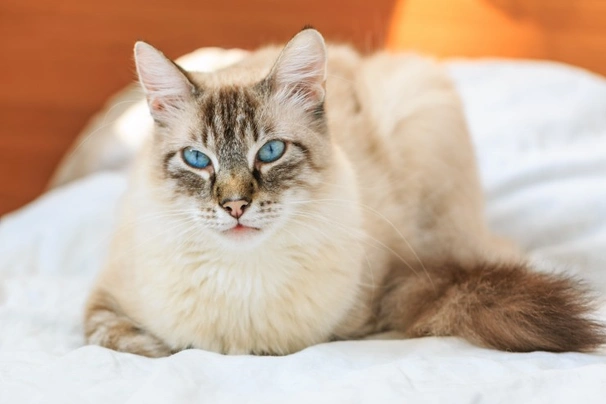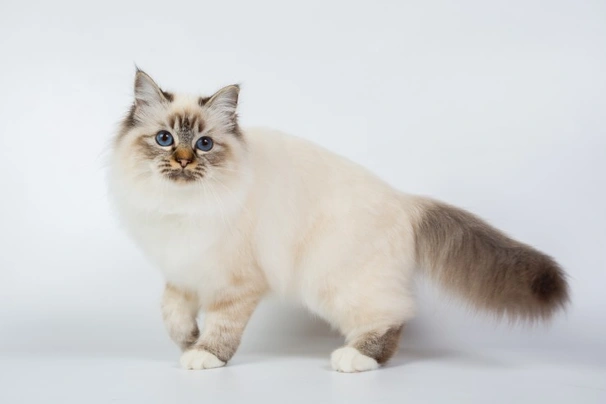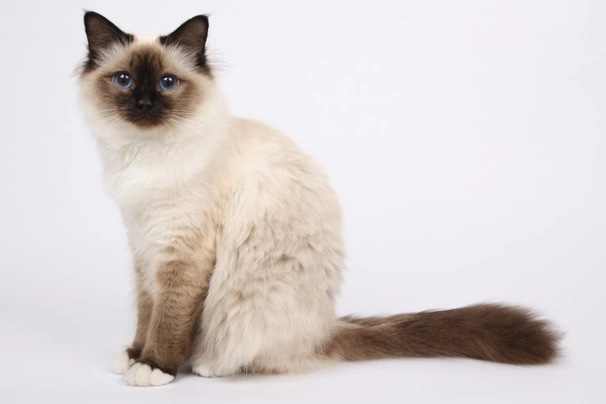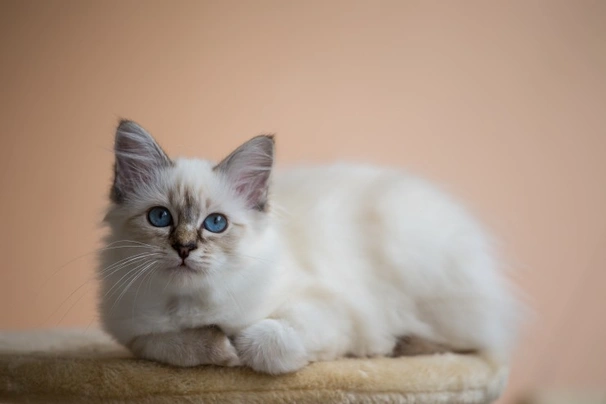Birman
Introduction of the Birman
Birmans are known to be gentle affectionate and playful cats which has seen the breed becoming a popular companion and family pet. Known as the "Sacred Cat of Burma" they boast having extremely beautiful blue eyes and a noble look about them which is paired to a lovely semi-long soft silky coat and their lovely white paws. These kind natured cats come in twenty different colours all of which are gorgeous. Today the Birman is among one of the most popular breeds not only here in the UK but elsewhere in the world too.
History of the Birman
The history of the Sacred Cat of Burma is steeped in legend and it's said the breed was given their gorgeous coats and stunning blue eyes as a reward from a Goddess because a temple cat was so loyal and dedicated to a priest. From then the legend tells of how priests who pass away come back as temple cats.
Although just a legend there is some evidence of similar looking cats having been around for a very long time and that the Birman is not just another newly developed breed. In the 1930s many seal-point cats were seen living in temple ruins in Burma and although feral they were protected and fed by locals who believed in the legend and therefore thought it would put their souls in danger if any harm ever came to the cats.
More recently photographs of similar looking cats have been found in a shop in Burma and that cats resembling the breed were then found in the shop’s garden. These cats were described by locals as being "the cats of the country". In 1988 other breeders visited Burma and found photographic evidence of very similar looking cats although they were not allowed to enter Burma because of the political unrest the country was experiencing at the time. As such there is a strong belief that the Birman does in fact originate from Burma and therefore could well be an ancient breed.
Birmans were first recognised in France back in the mid-twenties but it was not until 1966 that the breed was finally accepted by the GCCF. Today these charming cats have remained a popular choice both as companions and family pets thanks to their wonderfully kind placid natures and adorable looks.
Appearance of the Birman
Birmans are medium to large in size and boast having powerful strong bodies and lovely gentle expression in their eyes. Birman kittens are born white and only start developing their colour points when they are around a week old if they are going to be a darker colour. If their points are going to be a lighter colour like lilac then kittens only start to develop them when they are around 2 weeks old. However it’s worth noting that it takes 2 years before a Birman develops their full adult colours.
They have medium length coats which boast having the same point patterns as that of the Siamese. In short they have darker hair on their faces ears legs and on their tails than on the rest of their bodies. They have broad rounded heads bright blue eyes and medium size ears set nicely spaced apart. They moderately long noses that boast having a slight dip when seen in profile. They have well developed chins and nice full cheeks. Their bodies are long well-boned and large with cats having medium length thickly set legs and short strong paws. Tails are nice and bushy yet well in proportion with the rest of the body which adds to their overall well balanced appearance.
When it comes to their coats Birmans can be found in 20 colours. They have long silky hair that's soft to the touch and cats have a full ruff around their necks and the hair on their bellies is a little curled. All Birmans boast having white paws which is a lovely characteristic of the breed. The white on a cat's hind paws extends further up their legs to the point of a cat's hock. The different colour points are as follows:
Solid Point Birmans
- Seal Point
- Blue Point
- Chocolate Point
- Lilac Point
- Red Point
- Cream Point
Tortie Point Birmans
- Seal Tortie Point
- Blue Tortie
- Chocolate Tortie
- Lilac Tortie Point
Tabby Point Birmans
- Seal Tabby
- Blue Tabby Point
- Chocolate Tabby Point
- Lilac Tabby Point
- Red Tabby Point
- Cream Tabby Point
Tortie Tabby Point Birmans
- Blue Tortie Tabby Point
- Chocolate Tortie Tabby Point
- Lilac Tortie Tabby Point
Temperament of the Birman
The Birman is a stunning cat to look at but it is their kind and gentle natures that has helped the breed remain one of the most popular choices with cat lovers the world over. They adore human company and are known for the way they "talk" to their owners which is more of a chirp than a meow. Birmans are also known to be incredibly social which means they generally get on well with other cats and dogs.
They love to be involved in everything that goes on in a household and are never very happy when left on their own for long periods of time. As such they are best suited to families where at least one person remains at home when everyone else is out of the house. They are also like to be kept busy in between their cat naps which means investing in lots of interactive toys for them to play with. They also like to have a few scratching posts strategically placed around the home where they can stretch and pull their claws when they feel like it.
Birmans adapt very well to being kept as indoor pets which is especially useful if you live in town or near any busy roads. However if you live in the country and it’s safe for a cat to roam around in the great outdoors Birmans do love exploring their environment so they can mark their territory.
Intelligence / Trainability of the Birman
They are highly intelligent and as previously mentioned they love to be involved in everything that goes on around them. They will happily follow an owner from room to room to see what they are doing and although vocal they are not as talkative as their Siamese cousins. They love playing games but are just as happy to curl up next to someone on a sofa in the evening which is another reason why they make such wonderful companions for older people.
Children and other
Birmans are known to be very tolerant around children and like to play interactive games with them. However toddlers and younger children need to be taught how to handle and behave around cats to avoid any mishaps. With this said any interaction between children and cats should always be well supervised by an adult to make sure things stay nice and calm.
Birmans are also known to get on well with dogs providing they are good around cats that is. However care should be taken when introducing a Birman to dogs they don't already know just in case the dog does not get on with their feline counterparts. They are incredibly social by nature and have been known to get on with everyone and everybody but it's always wiser to keep a close eye on any cat when they are around smaller pets just in case.
Health of the Birman
The average life expectancy of a Birman is between 12 and 16 years when properly cared for and fed an appropriate good quality diet to suit their ages.
The Birman is known to suffer from a few hereditary health issues which are worth knowing about if you are planning share your home with one of these beautiful cats. The conditions that seem to affect the breed the most include the following:
- Feline hypertrophic cardiomyopathy (HCM) - stud cats should always be screened for this disorder
Caring for the Birman
As with any other breed Birmans need to be groomed on a regular basis to make sure their coats and skin are kept in top condition. On top of this cats need to be fed good quality food that meets all their nutritional needs throughout their lives which is especially true of kittens and older cats.
Grooming of the Birman
Although Birmans boast having longish coats that are silky to the touch their hair does not tend to matt and as such they are low maintenance on the grooming front. A weekly brush all it takes to keep their coats in good condition and to remove any loose hair. Like other breeds they tend to shed the most in the Spring and then again in the Autumn when more frequent brushing is usually necessary to keep on top of things.
It's also important to check a cat's ears on a regular basis and to clean them when necessary. If too much wax builds up it can lead to a painful infection which can be hard to clear up. In short prevention is often easier than cure with ear infections. Cats often suffer from ear mites which can be a real problem which is another reason why it's so important to check their ears on a regular basis.
Exercise of the Birman
Birmans are known to be playful by nature but not excessively so. They love being able to explore the great outdoors but they are quite happy living in a household where they are kept as indoor pets too. With this said if they are not allowed to go outside for whatever reason a Birman would need to be given lots of interactive toys and this should include scratching posts high vantage points they can climb up to and lots of places where they can snuggle up for a snooze during the day.
Feeding of the Birman
If you get a Birman kitten from a breeder they would give you a feeding schedule and it's important to stick to the same routine feeding the same kitten food to avoid any tummy upsets. You can change a kitten's diet but this needs to be done very gradually always making sure they don't develop any digestive upsets and if they do it's best to put them back on their original diet and to discuss things with the vet before attempting to change it again.
Older cats are not known to be fussy eaters but this does not mean they can be given a lower quality diet. It's best to feed a mature cat several times a day making sure it's good quality food that meets all their nutritional requirements which is especially important as cats get older. It's also essential to keep an eye on a cat's weight because if they start to put on too much it can have a serious impact on their overall health and wellbeing. Like other breeds Birmans need to have free access to fresh clean water at all times.
Birman price
If you are looking to buy a Birman you would need to pay upwards of £500 for a well-bred pedigree kitten. The cost of insuring a male 3-year-old Birman in northern England would be £12.13 a month for basic cover but for a lifetime policy this would set you back £23.79 a month (quote as of Sept 2016). When insurance companies calculate a pet's premium they factor in several things which includes where you live in the UK a cat's age and whether they have been neutered or spayed among other things.
When it comes to food costs you need to buy the best quality food whether wet or dry making sure it suits the different stages of a cat’s life. This would set you back between £15 - £20 a month. On top of this you need to factor in veterinary costs if you want to share your home with a Birman and this includes their initial vaccinations their annual boosters the cost of neutering or spaying a cat when the time is right and their yearly health checks all of which quickly adds up to over £500 a year.
As a rough guide the average cost to keep and care for a Birman would be between £30 to £50 a month depending on the level of insurance cover you opt to buy for your cat but this does not include the initial cost of buying a well-bred kitten.

Birman kittens
£800
Lovely Birman Shorthair
£100



